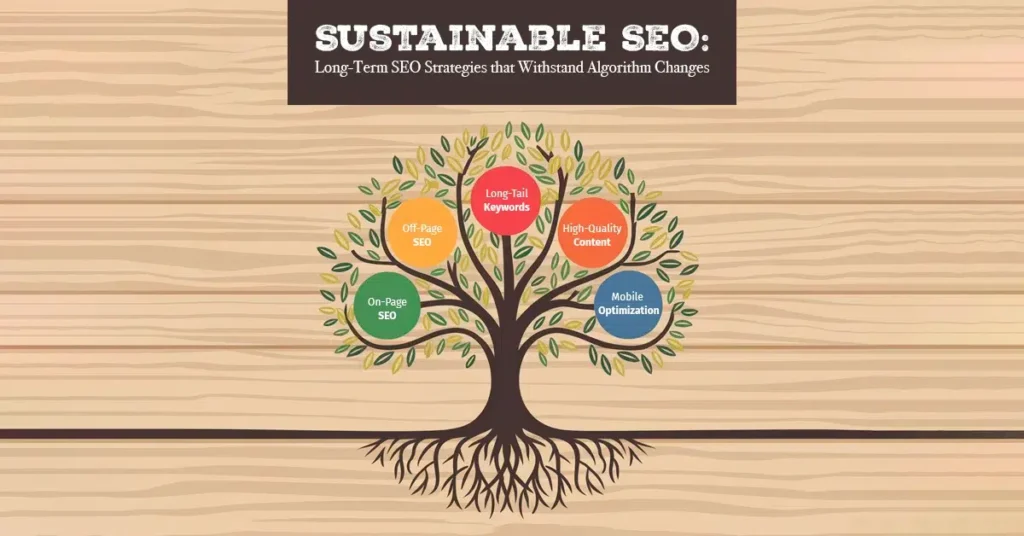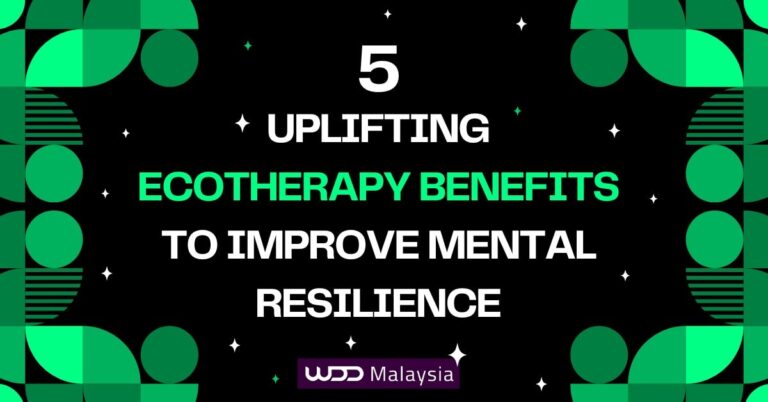
Search engine optimization (SEO) is essential in digital marketing, and sustainable practices ensure long-term success. With frequent algorithm changes, businesses need adaptable strategies to maintain visibility and achieve consistent results. SEO experts emphasise the importance of resilience, as evolving strategies provide stability in a constantly shifting environment.
By focusing on innovation and continuous improvement, SEO professionals help businesses stay competitive, ensuring ongoing engagement and growth in line with industry trends.
Understanding Sustainable SEO Fundamentals

The Basics of SEO Strategies
On-Page SEO
On-Page SEO involves optimising individual web pages to improve search engine rankings. High-quality content is key, and keywords must be integrated naturally within the text. SEO experts often underscore the importance of strategic keyword placement. Optimising headers, meta tags, and adding alt text to images enhances both accessibility and SEO value. Additionally, a well-structured internal linking system and a clear site’s structure improve navigation and boost rankings, making On-Page SEO crucial for balancing user experience with search engine requirements.
Off-Page SEO
Off-Page SEO focuses on external efforts to enhance a website’s ranking. Link building, a vital aspect, involves obtaining quality backlinks from reputable sites to boost SEO performance. Engagement on social media increases visibility and authority, while brand mentions across the web contribute to success. Guest blogging on authoritative platforms further expands exposure. A strategic approach to Off-Page SEO helps build trust and establishes a website’s authority in the digital space.
Importance of SEO Tactics in Digital Marketing
Driving Organic Traffic
SEO plays a key role in driving organic traffic by improving a website’s visibility in search engine results. Repurposing a blog post into various formats like videos or infographics can enhance audience reach and engagement. High-quality, relevant content attracts users and boosts engagement, which search engines reward with higher rankings. Organic traffic, unlike paid traffic, offers a sustainable source of visitors. Success in SEO hinges on continuous optimization and tracking, with analytics tools helping measure the effectiveness of strategies. Over time, organic traffic becomes a cornerstone of long-term digital marketing success.
Enhancing User Experience
SEO also enhances user experience by ensuring that websites are optimised for both functionality and performance. Fast-loading pages, mobile-friendly designs, and clear navigation structures all contribute to user satisfaction and retention. A focus on user-centric design not only improves SEO performance but also provides valuable insights into user behaviour and preferences through analytics. Ultimately, an enhanced user experience leads to higher conversion rates and better overall results.
How Search Engines Work
Search engines are intricate systems designed to retrieve and rank web pages based on relevance, authority, and user experience. The process begins with crawling, where search engines discover and scan web pages using bots known as spiders. These bots follow links from one page to another, systematically covering the vast expanse of the internet.
Next is indexing, where the crawled data is stored and organized in a massive database. During this phase, search engines analyze the content, keywords, and metadata of each page to understand its context and relevance.
Finally, ranking determines the order in which web pages appear in search results. Search engines use complex algorithms that consider various factors, such as keyword usage, link equity, and content quality, to assess the relevance and authority of a web page. User experience also plays a crucial role, with factors like page speed, mobile-friendliness, and site structure influencing rankings. By understanding how search engines work, businesses can better tailor their SEO strategies to improve visibility and performance in search results.
Benefits of Long-Term SEO Approach
Adopting a long-term SEO approach offers a multitude of benefits that extend beyond immediate gains. One of the primary advantages is the steady increase in organic traffic. By consistently applying sustainable SEO strategies, businesses can improve their search engine rankings, making it easier for potential customers to find them.
A long-term approach also enhances brand credibility. High-quality content and ethical SEO practices build trust with both users and search engines, establishing your brand as a reliable source of information. This credibility translates into higher engagement and conversion rates.
Moreover, a long-term SEO strategy allows for continuous improvement and adaptation to evolving search engine algorithms. As search engines update their algorithms to prioritize user experience and content quality, businesses that focus on sustainable practices can remain relevant and visible in search results. This proactive approach ensures that your website not only withstands algorithm changes but thrives in the ever-changing digital landscape.
The Impact of Algorithm Changes

How Algorithms Affect SEO in Google
Historical Algorithm Updates
Algorithm updates have significantly shaped the evolution of SEO. Search engines introduced major changes that redefined ranking factors, forcing marketers to adapt. The Panda update, for example, prioritised content quality by penalising sites with thin or low-value content. Penguin targeted the integrity of backlinks, focusing on the quality of links rather than quantity. Hummingbird enhanced the understanding of search intent, greatly improving user experience. Each update demanded a shift in SEO strategy, with performance analysis before and after these changes providing valuable insights for future adjustments.
Current Trends in Algorithm Changes
Today, algorithm changes continue to drive SEO practices. Machine learning, particularly through updates like BERT, has improved the interpretation of natural language, influencing how content is evaluated. Core Web Vitals now emphasise page speed and user experience as critical ranking factors, while mobile-first indexing prioritises websites optimised for mobile devices. Staying informed about these trends allows businesses to refine their SEO strategies, and analytics tools are essential for tracking and understanding the impact of these ongoing changes.
Adapting to Algorithm Updates and Changes
Monitoring Updates
Keeping track of algorithm updates is essential for effective SEO. Search engines typically announce major changes through official channels, and industry blogs and forums often provide detailed insights into their impact. Regular monitoring of these sources ensures you’re always informed. Analytics tools play a vital role in tracking any fluctuations in website performance, helping you identify areas needing improvement after an update.
Adjusting Strategies Accordingly
To maintain SEO success, strategies must be continuously adjusted in response to updates. Prioritising content quality, auditing backlink profiles, and improving user experience remain key focus areas. Enhancing mobile optimization and site speed also supports ranking efforts. Analytics provide the data needed to refine strategies, ensuring a proactive approach and resilience against algorithm changes.
Building a Strong SEO Foundation

Relevant Keyword Research and Optimization
Identifying Long-Tail Keywords
Long-tail keywords, typically consisting of three or more words, are crucial for enhancing SEO. These keywords often face lower competition and attract more targeted traffic, as users searching with long-tail keywords generally have specific intent. SEO tools help identify these valuable keywords by analysing search volume and competition. Incorporating long-tail keywords into content boosts visibility and aligns your site with user intent.
Using Keywords Naturally
Natural keyword usage improves both readability and SEO performance. Avoiding keyword stuffing and focusing on content that flows smoothly ensures better rankings, as search engines prioritise value-driven content. Placing keywords strategically within headings and paragraphs enhances relevance without compromising user experience. SEO tools can assist in optimal placement, but the priority should always be to engage and provide meaningful information to readers.
High-Quality Content Creation
Creating Valuable Content
Valuable content lies at the heart of an effective SEO strategy. Repurposing a blog post into different formats such as videos or infographics can significantly enhance audience reach and engagement. High-quality, informative content not only attracts backlinks and social shares but also positions you as an authority in your industry. By addressing readers’ needs and questions, you can foster engagement and trust. SEO tools are useful in analysing content performance, ensuring it resonates with your audience. Regularly updating content keeps it fresh and encourages repeat visits.
Content Refresh and Update
Regularly refreshing and updating content is essential for maintaining relevance and strong SEO rankings. Outdated content can harm visibility, while up-to-date insights and data improve user experience. Using SEO tools to identify performance gaps helps guide effective content updates. A consistent refresh strategy signals to search engines that your site is active and relevant, keeping engagement high and ensuring long-term visibility.
Mobile Optimization
In today’s digital age, mobile optimization is crucial for sustainable SEO success. With the majority of web traffic coming from mobile devices, search engines prioritize mobile-friendly websites in their rankings. A mobile-optimized website ensures a seamless user experience, fast loading speeds, and easy navigation, all of which are essential for retaining visitors and improving engagement.
Achieving mobile optimization involves several key practices. Responsive design is fundamental, as it allows your website to adapt to different screen sizes and orientations. Optimizing images and videos to load quickly on mobile devices is also critical, as slow-loading media can frustrate users and increase bounce rates. Additionally, ensuring that all website elements, such as buttons and menus, are easily accessible on smaller screens enhances usability.
By prioritizing mobile optimization, businesses can improve their search engine rankings, enhance user experience, and ensure long-term SEO success.
Technical SEO for Sustainability

Technical SEO Considerations for Growing Sites
Website Architecture
A well-structured website architecture and a clear site’s structure are the foundation of effective SEO. Clear hierarchy and logical organisation not only improve user experience but also assist search engines in efficiently crawling and indexing your site. Intuitive navigation helps users easily find information, while a solid structure supports your long-term SEO efforts, ensuring ongoing visibility and engagement.
Mobile Optimization
Mobile optimization is essential in today’s SEO landscape, with more users accessing websites via mobile devices. A mobile-friendly design enhances user experience, and responsive design ensures seamless access across all devices. Search engines prioritise mobile-optimised sites, making mobile optimization a key element in sustaining SEO success.
Site Speed and Performance
Site speed plays a critical role in SEO performance by reducing bounce rates and boosting user satisfaction. Fast-loading pages are favoured by search engines, and optimising elements like images and caching can significantly enhance speed. Prioritising site performance not only strengthens your SEO strategy but also ensures users have quick and easy access to your content.
Secure and Accessible Websites
Security and Accessibility
Security and accessibility are key pillars of a sustainable SEO strategy. Secure websites build user trust, protecting their data and receiving higher search engine rankings. Accessibility ensures that all users, including those with disabilities, can easily navigate your site. A strong commitment to both security and accessibility not only enhances user experience but also supports long-term SEO success.
HTTPS Implementation
Implementing HTTPS is essential for protecting user data and fostering trust. Secure connections prevent data breaches, safeguarding privacy and ensuring users feel confident in sharing information. Search engines prioritise HTTPS-enabled sites in rankings, making it a crucial element of any SEO strategy focused on security.
Accessibility Standards
Adhering to accessibility standards ensures your website is inclusive and user-friendly for everyone. Accessible websites cater to individuals with disabilities, improving overall user experience. Search engines reward sites that comply with standards like WCAG, recognizing the effort to provide an inclusive digital environment. Prioritising accessibility strengthens your SEO and ensures that all users can engage with your content effectively.
Page Speed Improvement
Page speed is a critical factor in both search engine rankings and user experience. A slow-loading website can lead to high bounce rates, low engagement, and poor search engine rankings. Improving page speed is essential for retaining visitors and enhancing overall site performance.
Several strategies can be employed to boost page speed. Optimizing images by compressing them without sacrificing quality can significantly reduce load times. Minifying CSS and JavaScript files removes unnecessary characters and spaces, streamlining code and improving load speed. Leveraging browser caching allows frequently accessed resources to be stored locally on users’ devices, reducing the need to reload them with each visit. Additionally, using a content delivery network (CDN) distributes your content across multiple servers worldwide, ensuring faster access for users regardless of their location.
A fast-loading website not only enhances user experience but also improves search engine rankings, making page speed improvement a vital component of any sustainable SEO strategy.
Site Architecture and Navigation
A well-structured site architecture and navigation are essential for sustainable SEO success. A clear hierarchy, intuitive menu, and easy-to-use navigation help search engines understand the website’s structure and content, leading to better indexing and higher rankings.
To achieve this, use descriptive URLs that clearly indicate the content of each page. Creating a logical menu with well-organized categories and subcategories ensures that users can easily find the information they need. Implementing breadcrumbs and internal links enhances user orientation, guiding visitors through your site and encouraging them to explore more content.
A well-structured website not only improves user experience but also increases engagement and enhances search engine rankings. By focusing on site architecture and navigation, businesses can build a strong foundation for long-term SEO success.
Deep Focus on Leveraging User Experience (UX)

Importance of UX in SEO
User experience (UX) is a crucial factor in SEO, as search engines like Google prioritise websites that offer superior UX. A well-designed, user-friendly site enhances satisfaction, engagement, and retention, leading to better rankings. Ethical SEO practices ensure that your site remains accessible and intuitive, contributing to long-term success. Advanced SEO strategies often focus on refining UX to increase conversions and improve overall visibility.
User-Friendly Navigation
Effective navigation is a cornerstone of good UX and SEO performance. Visitors should easily locate the information they seek, and clear menus paired with intuitive layouts enhance this experience. Google rewards sites with streamlined navigation structures, reinforcing the importance of easy content access. A well-organised site structure ensures SEO growth over time, regardless of algorithm changes.
Engaging and Interactive Design
Incorporating engaging, interactive design elements such as videos and infographics captivates users, prolongs their visits, and reduces bounce rates. Google favours websites that keep users engaged, and integrating interactive content into your design can significantly boost visibility. SEO efforts should prioritise creating visually appealing, interactive content that resonates with users while enhancing overall site performance.
Measuring UX Impact
Understanding UX Impact on SEO
Measuring the impact of UX on SEO is essential for ongoing improvement. Analysing user behaviour provides valuable insights into how visitors interact with your site, helping to refine your SEO strategy. Ethical SEO practices emphasise regular assessments of user engagement metrics to ensure your site remains user-friendly and aligned with visitor needs.
Analysing User Behaviour
Tracking how visitors navigate your site offers key insights for optimising SEO. Tools like Google Search Console provide data on click-through rates, page views, and user interactions. Understanding which pages attract the most attention helps guide content and design improvements. Data-driven insights ensure your SEO efforts align with user preferences and expectations, supporting ethical and effective strategies.
Tools for UX Assessment
A variety of tools, including Google Search Console, heatmaps, and session recordings, are invaluable for assessing UX and improving SEO strategies. These tools reveal how users engage with your site, highlighting areas that need optimization in design or navigation. Regular evaluations using these tools ensure continuous improvement, keeping your SEO efforts aligned with user behaviour and algorithm changes.
Building Authority and Trustworthy Natural Backlinks

Natural Backlinks for Sustainable SEO
Link Building Strategies
Earning quality backlinks is essential for building authority in SEO. Links from reputable sites enhance your site’s credibility and are highly valued by Google for ranking purposes. A strong, natural backlink profile boosts SEO efforts, and guest posting on authoritative blogs or collaborating with industry leaders can help attract these valuable connections. Consistent content creation also encourages organic link building, as engaging content often leads to comments, shares, and further visibility.
Avoiding Black Hat Techniques
To ensure sustainable SEO growth, it’s crucial to avoid black hat techniques, such as buying backlinks or using link farms, which violate Google’s guidelines. These unethical tactics can lead to penalties that severely harm your site’s rankings. Ethical SEO strategies focus on long-term success by building trust through transparency, quality content, and genuine engagement, all of which attract natural backlinks and secure lasting SEO benefits.
Establishing Brand Authority
Thought Leadership Content
Creating thought leadership content is key to establishing brand authority. By sharing valuable insights and solutions, you demonstrate expertise and build trust with your audience. Consistent publication of well-researched, insightful articles positions your brand as a trusted source of information. This not only engages your audience but also supports SEO growth by attracting backlinks from other experts in the field, further enhancing your authority.
Social Proof and Reviews
Social proof, including positive reviews, plays a significant role in building brand trust. Customers often rely on the experiences of others when making purchasing decisions. Encouraging satisfied clients to leave reviews boosts credibility, and Google factors reviews into local SEO rankings. Actively engaging with comments and reviews strengthens customer relationships and fosters a positive brand image, which contributes to sustainable SEO success.
Content Marketing and Social Media for SEO

Content Quality Impact SEO
Content Calendars
A content calendar acts as a strategic tool for aligning your content creation with SEO goals. It helps you plan and consistently publish content, enhancing your site’s visibility and authority over time. By tracking important dates and events, you can produce timely, relevant material that search engines favour. Regular updates through a well-maintained content calendar also ensure ongoing user engagement, supporting long-term SEO growth.
SEO-Friendly Content Formats
Utilising SEO-friendly content formats is key to improving your site’s search engine rankings. Structured formats—like headings, bullet points, and lists—not only make content more readable but also aid in better indexing by search engines. Incorporating visual elements such as images and videos increases user engagement and dwell time, which further boosts SEO. Diverse content formats cater to different user preferences, supporting an SEO strategy that focuses on sustained growth and success.
Social Media Influence SEO
Social Media Integration
Integrating social media into your content promotion strategy significantly amplifies reach and visibility. Sharing content across platforms not only drives traffic to your website but also fosters trust and loyalty through consistent engagement with your audience. Social signals, such as likes, shares, and comments, contribute positively to SEO, enhancing your brand’s authority. By increasing exposure, social media integration supports long-term SEO growth and helps build a strong foundation for sustained success.
Influencer Collaborations
Collaborating with industry influencers adds credibility and extends your content’s reach to new audiences. Influencers provide authentic endorsements that resonate with their followers, driving traffic and engagement to your site. These partnerships often result in valuable backlinks, strengthening your site’s authority and improving SEO performance. Influencer collaborations help attract organic traffic and create a resilient SEO strategy that adapts to algorithm changes, ensuring long-term visibility and growth.
Local SEO Strategies

Local SEO Techniques Enhance Sustainability
Importance of Local SEO
Local SEO is essential for businesses aiming to attract customers within specific geographic areas. By optimising their online presence, local businesses can increase visibility in search results and connect with nearby customers seeking products or services. Understanding the significance of Local SEO and leveraging tools like Google is key to achieving sustained success in localised search efforts.
Google My Business Optimization
Google My Business (GMB) is a vital tool for boosting Local SEO visibility. Claiming and verifying your GMB listing ensures accurate business information, such as address and phone number, which builds customer trust. High-quality images, engaging descriptions, and regular updates keep your listing attractive and relevant. Customer reviews play a significant role in Local SEO rankings, and responding to reviews demonstrates active engagement. Monitoring GMB insights allows businesses to make data-driven improvements to their local strategies.
Local Citations and Reviews
Local citations, which are mentions of your business’s name, address, and phone number on various websites, are crucial for enhancing Local SEO. Consistency across platforms prevents customer confusion and strengthens your local search presence. Reviews on sites like Yelp and TripAdvisor not only impact Local SEO rankings but also build trust with potential customers. Encouraging positive reviews and responding to feedback demonstrate a commitment to customer satisfaction and further reinforce your Local SEO efforts.
Targeting Local Audiences
Tailored SEO Strategies for Local Audiences
Effectively targeting local audiences requires SEO strategies that resonate with the specific community. Businesses need to craft content that directly speaks to local customers, addressing their unique preferences and needs. Engaging with the community helps build stronger connections, fostering brand loyalty and enhancing the overall customer experience.
Localised Content
Creating localised content means addressing topics that are relevant to the local community. Incorporating local events, news, and cultural elements into blogs, articles, and social media posts boosts visibility and strengthens engagement. Using local keywords enhances search engine rankings for targeted audiences. By reflecting the unique characteristics of the area, businesses position themselves as integral members of the community, encouraging more visitors and repeat interactions.
Community Engagement
Active community engagement is essential for strengthening a business’s presence in the local market. Participating in local events, sponsoring activities, and collaborating with local influencers can amplify your reach and build credibility. Social media platforms provide a direct channel for interacting with the community, sharing stories, and showcasing testimonials from local customers. Involvement in community initiatives fosters trust, creating lasting impressions and supporting long-term SEO growth.
Measuring SEO Success with Analytics and SEO Tools

Data-Driven SEO Insights as KPI
Organic Traffic Metrics
Organic traffic is a crucial metric for evaluating the success of your SEO efforts. It tracks the number of visitors coming to your site through unpaid search results, with a consistent rise in organic traffic indicating effective strategies. Monitoring these metrics helps you understand user engagement and make data-driven refinements to your SEO approach. SEO tools provide detailed insights into visitor behaviour, ensuring continuous adaptation to evolving SEO trends.
Conversion Rate Analysis
Conversion rate analysis measures how well your website converts visitors into customers, offering a clear view of your content’s effectiveness in driving actions. High conversion rates signal that your SEO and user experience strategies are working well. Analysing conversion data with the help of SEO tools highlights areas for improvement, particularly in Local SEO, ensuring that your site meets user expectations and supports profitability.
Tools for SEO Analytics
Google Analytics
Google Analytics provides detailed insights into your website’s performance, tracking user interactions and traffic sources. It helps Digital Marketing Managers assess the impact of SEO strategies by identifying which content performs well and what areas need improvement. Regular use of Google Analytics supports ongoing adjustments, ensuring your SEO strategy remains effective in an ever-evolving digital landscape.
SEO Audit Tools
SEO audit tools are essential for evaluating your website’s technical health and overall performance. By identifying issues that may affect visibility and rankings, these tools help ensure your site remains aligned with current SEO trends. Regular audits provide actionable insights, particularly for optimising Local Search, contributing to long-term SEO success and maintaining a competitive edge in the market.
Continuous Improvement and Adaptation in the Digital Landscape

Staying Updated with Sustainable SEO Practices
Industry News and Updates
Keeping up with industry news is essential for maintaining effective SEO strategies. Search engines frequently update their algorithms, affecting rankings, so regularly reading reputable sources ensures you’re prepared. Insights from industry experts provide guidance on new trends and necessary adjustments. Staying informed allows you to refine your strategy and adapt to changes, ensuring continued SEO success.
SEO Conferences and Webinars
Attending SEO conferences and webinars is a valuable way to stay current on emerging trends and best practices. These events offer learning opportunities from industry leaders and provide insights into specialised areas like SaaS and Ecommerce SEO. Networking with peers and engaging in discussions strengthens your overall SEO efforts. Webinars offer the added benefit of flexibility, allowing you to continue learning from anywhere.
Experimentation and Testing for Strong SEO Foundation
A/B Testing for SEO
A/B testing is a crucial tool for optimising SEO performance. By comparing two versions of a webpage, you can determine which one drives higher engagement and better results. This method helps identify key elements that improve user experience, a factor that search engines value highly. Regular A/B testing ensures your site consistently meets user expectations, and implementing the results enhances your overall SEO strategy.
Iterative Strategy Development
Iterative strategy development focuses on making small, incremental adjustments to continuously improve your site’s performance. By analysing data from A/B tests and user feedback, you can refine your approach to align with user needs and search engine preferences. Regular updates keep your content relevant, and this process supports sustainable long-term growth, particularly in Local SEO.
SEO Essentials for Long-Term SEO Strategies and Success
Sustainable SEO is critical for maintaining visibility and engagement over time. Adapting proactively to algorithm changes ensures ongoing success. Regularly updating your SEO strategies—especially in Local SEO—helps businesses enhance their presence in targeted areas. Social media also plays a crucial role in building authority, particularly through engaging with customer feedback. Tools like Google Analytics provide valuable insights into user behaviour, while search engines reward high-quality, relevant content. Ultimately, success in SEO comes from adapting to industry trends and following best practices, all while maintaining a well-rounded strategy.




